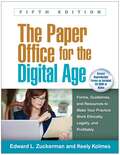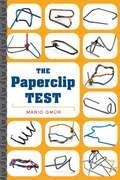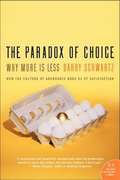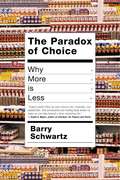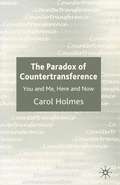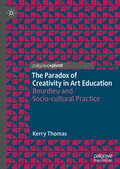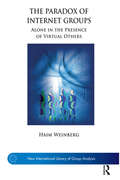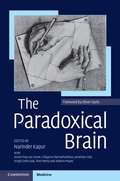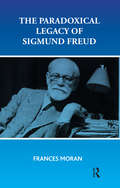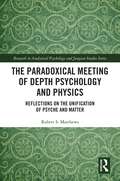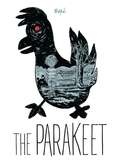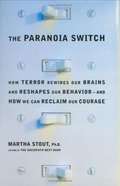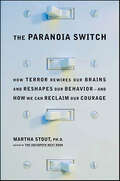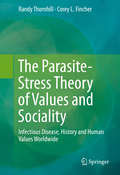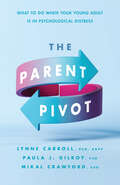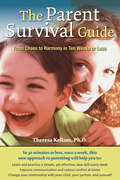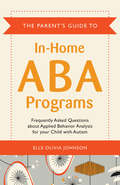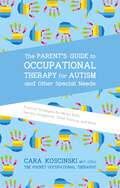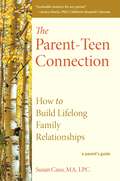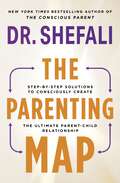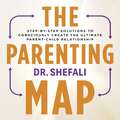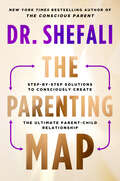- Table View
- List View
The Panicosaurus: Managing Anxiety In Children Including Those With Asperger Syndrome (K. I. Al-Ghani Children's Colour Story)
by K.I. Al-GhaniHave you ever felt a sense of dread and worry creeping over you? That might be the Panicosaurus coming out to play… Sometimes the Panicosaurus tricks Mabel's brain into panicking about certain challenges, such as walking past a big dog on the street or when her favourite teacher is not at school. With the help of Smartosaurus, who lets her know there is really nothing to be afraid of. Mabel discovers different ways to manage Panicosaurus, and defeat the challenges he creates for her. This fun, easy-to-read and fully illustrated storybook will inspire children who experience anxiety, and encourage them to banish their own Panicosauruses with help from Mabel's strategies. Parents and carers will like the helpful introduction, explaining anxiety in children, and the list of techniques for lessening anxiety at the end of the book.
The Paper Office for the Digital Age: Forms, Guidelines, and Resources To Make Your Practice Work Ethically, Legally, and Profitably
by Edward L. Zuckerman Keely KolmesSignificantly revised and updated to include online and computerized aspects of private practice, this essential manual has given many tens of thousands of clinicians the complete record-keeping and risk-reduction tools that every psychotherapy practice needs. The book provides effective methods for obtaining informed consent, planning treatment and documenting progress, managing HIPAA compliance, maintaining clinical and financial records, communicating with clients and third-party payers, and reducing malpractice risk. Drawing from the professional literature, it features key guidance and easy-to-digest pointers about the ethical, legal, and business aspects of practice. With a large-size format for easy photocopying, the book and enclosed CD-ROM include 53 reproducible forms and handouts. Purchasers also get access to a companion website where they can download and customize the reproducible materials. <p><p> New to This Edition: <p>*Updated throughout to reflect today's greater use of electronic/digital technologies in practice management. <p>*Chapter on insurance and billing, coping with managed care, and Medicare. *Chapter on private practice marketing, including Internet and social media dos and don'ts. <p>*Expanded topics: HIPAA compliance, ICD-10, responding to subpoenas, and using online technologies for billing, communication, and record keeping. <p>*Information about hundreds of websites dealing with all aspects of operating a practice. <p><p> See also Clinician's Thesaurus, 8th Edition, by Edward L. Zuckerman, the indispensable resource for conducting interviews and writing psychological reports.
The Paperclip Test: A Personality Quiz Like No Other
by Mario GmürAn entertaining and enlightening personality test, using that humblest of objects—a bent paperclip—to pick the lock of your psyche What does your workspace say about you? The best clues aren&’t in your desk or on your computer. Rather, they&’re those paperclips in your wastebasket—the ones you&’ve fiddled with, probably without even realizing it. When psychiatrist Mario Gmür started scrutinizing paperclips bent by his patients, he found that they actually reveal multitudes about the creator&’s character, quirks, and hidden desires. Are you an optimist? A pushover? A baby? A bully? After studying the links between paperclip shapes and distinct character types, Gmür has created a delightful collection of quizzes and psychological profiles that allow readers to discover their innermost secrets using these miniature metallic sculptures. Part Rorschach test and part humorous horoscope, The Paperclip Test offers an amusing yet insightful personality gauge for anyone who has ever bent a paperclip without thinking about what secrets that tiny shape might hold.
The Paradox of Choice
by Barry SchwartzIn the spirit of Alvin Toffler's Future Shock, a social critique of our obsession with choice, and how it contributes to anxiety, dissatisfaction and regret. This paperback includes a new P.S. section with author interviews, insights, features, suggested readings, and more. Whether we're buying a pair of jeans, ordering a cup of coffee, selecting a long-distance carrier, applying to college, choosing a doctor, or setting up a 401(k), everyday decisions--both big and small--have become increasingly complex due to the overwhelming abundance of choice with which we are presented.We assume that more choice means better options and greater satisfaction. But beware of excessive choice: choice overload can make you question the decisions you make before you even make them, it can set you up for unrealistically high expectations, and it can make you blame yourself for any and all failures. In the long run, this can lead to decision-making paralysis, anxiety, and perpetual stress. And, in a culture that tells us that there is no excuse for falling short of perfection when your options are limitless, too much choice can lead to clinical depression.In The Paradox of Choice, Barry Schwartz explains at what point choice--the hallmark of individual freedom and self-determination that we so cherish--becomes detrimental to our psychological and emotional well-being. In accessible, engaging, and anecdotal prose, Schwartz shows how the dramatic explosion in choice--from the mundane to the profound challenges of balancing career, family, and individual needs--has paradoxically become a problem instead of a solution. Schwartz also shows how our obsession with choice encourages us to seek that which makes us feel worse.By synthesizing current research in the social sciences, Schwartz makes the counterintuitive case that eliminating choices can greatly reduce the stress, anxiety, and busyness of our lives. He offers eleven practical steps on how to limit choices to a manageable number, have the discipline to focus on the important ones and ignore the rest, and ultimately derive greater satisfaction from the choices you have to make.
The Paradox of Choice
by Barry SchwartzIn the spirit of Alvin Toffler's Future Shock, a social critique of our obsession with choice, and how it contributes to anxiety, dissatisfaction and regret. This paperback includes a new P.S. section with author interviews, insights, features, suggested readings, and more.Whether we're buying a pair of jeans, ordering a cup of coffee, selecting a long-distance carrier, applying to college, choosing a doctor, or setting up a 401(k), everyday decisions--both big and small--have become increasingly complex due to the overwhelming abundance of choice with which we are presented.We assume that more choice means better options and greater satisfaction. But beware of excessive choice: choice overload can make you question the decisions you make before you even make them, it can set you up for unrealistically high expectations, and it can make you blame yourself for any and all failures. In the long run, this can lead to decision-making paralysis, anxiety, and perpetual stress. And, in a culture that tells us that there is no excuse for falling short of perfection when your options are limitless, too much choice can lead to clinical depression.In The Paradox of Choice, Barry Schwartz explains at what point choice--the hallmark of individual freedom and self-determination that we so cherish--becomes detrimental to our psychological and emotional well-being. In accessible, engaging, and anecdotal prose, Schwartz shows how the dramatic explosion in choice--from the mundane to the profound challenges of balancing career, family, and individual needs--has paradoxically become a problem instead of a solution. Schwartz also shows how our obsession with choice encourages us to seek that which makes us feel worse.By synthesizing current research in the social sciences, Schwartz makes the counterintuitive case that eliminating choices can greatly reduce the stress, anxiety, and busyness of our lives. He offers eleven practical steps on how to limit choices to a manageable number, have the discipline to focus on the important ones and ignore the rest, and ultimately derive greater satisfaction from the choices you have to make.
The Paradox of Choice: Why More is Less
by Barry SchwartzA sociologist-psychologist studies the explosion of choices consumers face in western, particularly U.S., culture and the resulting stress and how individuals can respond.
The Paradox of Countertransference
by Carol A. V. HolmesIn this innovative text, Carol Holmes provides students and professional psychotherapists with an historical account leading to the most up-to-date information on the core psychoanalytic concept of countertransference and the subsequent changes that have occurred in its clinical application. This book uniquely examines the fundamental principles and practice that underpin some of the major schools of psychotherapy including psychoanalysis, existential, humanistic, integrative, systemic and communicative therapy. The author compares the philosophies that underline these diverse schools and explores their precepts in relation to the notion of countertransference. In contrast to traditional psychoanalytic texts, the countertransference theme of the book is examined in relation to the biased and contradictory aspect of the concept, and highlights some of the more radical and interpersonal ideas that endorse the relational and complementary qualities between therapist and client. The text offers concise and engaging introductions to the main schools of psychotherapy, and includes interviews and case study analyses from notable practitioners and trainers from these competing approaches. This book will be invaluable for those interested in understanding the importance of the hidden messages that are concealed in our communications.
The Paradox of Creativity in Art Education: Bourdieu and Socio-cultural Practice
by Kerry ThomasThis book examines the paradox of creativity in art education and proposes a possible resolution. Based on the findings of a longitudinal ethnographic study as a particular case of creative practice in art education, this book is underpinned by Bourdieu’s concepts of the habitus, symbolic capital and misrecognition. The author offers an insightful account of social reasoning within creative practice in the senior school art classroom, examining ongoing exchanges between students and their teacher. Ultimately, these exchanges culminate in actions, beliefs and desires about what is creatively conceivable in the making of art, while providing confirmation without corruption of the pedagogical role of the art teacher. Allowing the context of creative agency to emerge afresh, this book will be of interest and value to art educators and teachers committed to fostering the creative performances of students in any field.
The Paradox of Internet Groups: Alone in the Presence of Virtual Others (The New International Library of Group Analysis)
by Haim WeinbergThe New International Library of Group Analysis Drawing on the seminal ideas of British, European, and American group analysts, psychoanalysts, social psychologists, and social scientists, the books in this series focus on the study of small and large groups, organisations, and other social systems, and on the study of the transpersonal and transgenerational sociality of human nature. NILGA books will be required reading for the members of professional organisations in the fields of group analysis, psychoanalysis, and related social sciences. They will be indispensable for the “formation” of students of psychotherapy, whether they are mainly interested in clinical work with patients or in consultancy to teams and organisational clients within the private and public sectors.
The Paradoxical Brain
by Oliver Sacks Álvaro Pascual-Leone Tom Manly Andrew Mayes Jonathan Cole Sergio Della Sala Narinder Kapur Vilayanur RamachandranThe Paradoxical Brain focuses on a range of phenomena in clinical and cognitive neuroscience that are counter-intuitive and go against the grain of established thinking. The book covers a wide range of topics by leading researchers, including: * Superior performance after brain lesions or sensory loss * Return to normal function after a second brain lesion in neurological conditions * Paradoxical phenomena associated with human development * Examples where having one disease appears to prevent the occurrence of another disease * Situations where drugs with adverse effects on brain functioning may have beneficial effects in certain situations A better understanding of these interactions will lead to a better understanding of brain function and to the introduction of new therapeutic strategies. The book will be of interest to those working at the interface of brain and behaviour, including neuropsychologists, neurologists, psychiatrists and neuroscientists.
The Paradoxical Legacy of Sigmund Freud
by Frances MoranBy way of a new reading of The Complete Works of Sigmund Freud, this book introduces the notion of a theory of practice to the psychoanalytic endeavour. Spelled out in terms of interdependent components, namely; aim, technique and theoretical premises, the author takes the reader through Freud’s oeuvre so that he emerges as a relentless, theoretically grounded, practitioner. Moran argues that the nub of the Freudian inheritance is the concept of human subjectivity. In the light of this finding and her reading of Freud, she presents the work of Paul Verhaeghe (On Being Normal and Other Disorders), anew and calls on Marie Cardinal, (The Words to Say It), to provide telling evidence of what it means to be a Freudian subject. Given the objectifying processes at work in the contemporary culture, the relevance of Freud for our times becomes compelling. Here practitioners will find a clearly presented framework within which to operate and a way of organizing the material that informs their clinical pursuits. The exploration of an underpinning structure to The Complete Works will be of the utmost assistance to those who wish to embark upon a search for knowledge of the human condition through the highways and byways of the legacy of Sigmund Freud.
The Paradoxical Meeting of Depth Psychology and Physics: Reflections on the Unification of Psyche and Matter (Research in Analytical Psychology and Jungian Studies)
by Robert S. MatthewsThis book unites the worlds of physics and depth psychology through analysis of carefully selected existing and new dream materials. Their interpretation by Matthews provides fertile ground for the unifying of the extreme opposites of psyche and matter and forms a continuation of the deep dialogue between acclaimed psychologist Carl Jung and Nobel physicist Wolfgang Pauli. What emerges is an individuation process where inner and outer worlds are intertwined through a succession of dream images, culminating with that of the ring i, the mathematical function at the heart of quantum physics. This mysterious function unites wave and particle and symbolically carries the quality of paradox. The occurrence of the ring i in Pauli’s and the author’s dreams suggests paradox is a necessary psychological state to experience a living union between psyche and matter. Analysis of accompanying materials further indicates the arising of a new world view where inner and outer, mind and matter, may again be seen as a unified whole. This book is an engaging read for academics and researchers in the field of Jungian psychology and will appeal to those interested in the novel application of quantum physics to philosophy, psychology and spirituality.
The Parakeet
by Hannah EspéBastien is eight years old, and his mother is ill. She often has what his father and grandparents call "episodes." She screams and fights, scratches and spits, and has to be carted away to specialized clinics for frequent treatments. Bastien doesn’t like it when she goes, because when she comes home, she isn't the same. She has no feelings, no desires, and not much interest in him. According to the doctors, Bastien’s mother suffers from "bipolar disorder with schizophrenic tendencies," but he prefers to imagine her as a comic-book heroine, like Jean Grey, who may become Dark Phoenix and explode in a superhuman fury at any moment.Based on the creator’s own childhood experiences, The Parakeet is the story of a boy whose only refuge from life’s harsh realities lies in his imagination. In his eyes, we see the confusion and heartache he feels as he watches his mother’s illness worsen and the treatments fail. Through his eyes, we see how mental illness can both tear families apart and reaffirm the bonds of love. Poignant yet playful, The Parakeet follows Bastien’s struggle to accept the mother he has while wishing for the mother he needs.
The Paranoia Switch: How Terror Rewires Our Brains and Reshapes Our Behavior--and How We Can Reclaim Our Courage
by Martha StoutOn September 11, 2001, the "Fear Switch" in our brains got flicked. How do we turn it off and reclaim our lives? Five years after September 11, we're still scared. And why not? Terrorists could strike at any moment. Our country is at war. The polar caps are melting. Hurricanes loom. We struggle to control our fear so that we can go about our daily lives. Our national consciousness has been torqued by trauma, in the process transforming our behavior, our expectations, our legal system. In The Myth of Sanity, Martha Stout, who until recently taught at the Harvard Medical School, analyzed how we cope with personal trauma. In her national bestseller The Sociopath Next Door, she showed how to avoid suffering psychological damage at the hands of others. Now, in The Paranoia Switch,she offers a groundbreaking clinical, neuropsychological, and practical examination of what terror and fear politics have done to our minds, and to the very biology of our brains. In this timely and essential book, Stout assures us that we can interrupt the cycle of trauma and look forward to a future free of fear only by understanding our own paranoia--and what flips the paranoia switch.
The Paranoia Switch: How Terror Rewires Our Brains and Reshapes Our Behavior—and How We Can Reclaim Our Courage
by Martha StoutOn September 11, 2001, the "Fear Switch" in our brains got flicked. How do we turn it off and reclaim our lives?Five years after September 11, we're still scared. And why not? Terrorists could strike at any moment. Our country is at war. The polar caps are melting. Hurricanes loom. We struggle to control our fear so that we can go about our daily lives. Our national consciousness has been torqued by trauma, in the process transforming our behavior, our expectations, our legal system. In The Myth of Sanity, Martha Stout, who until recently taught at the Harvard Medical School, analyzed how we cope with personal trauma. In her national bestseller The Sociopath Next Door, she showed how to avoid suffering psychological damage at the hands of others. Now, in The Paranoia Switch, she offers a groundbreaking clinical, neuropsychological, and practical examination of what terror and fear politics have done to our minds, and to the very biology of our brains. In this timely and essential book, Stout assures us that we can interrupt the cycle of trauma and look forward to a future free of fear only by understanding our own paranoia—and what flips the paranoia switch.
The Parasite-Stress Theory of Values and Sociality
by Randy Thornhill Corey L. FincherThis book develops and tests an ecological and evolutionary theory of the causes of human values--the core beliefs that guide people's cognition and behavior--and their variation across time and space around the world. We call this theory the parasite-stress theory of values or the parasite-stress theory of sociality. The evidence we present in our book indicates that both a wide span of human affairs and major aspects of human cultural diversity can be understood in light of variable parasite (infectious disease) stress and the range of value systems evoked by variable parasite stress. The same evidence supports the hypothesis that people have psychological adaptations that function to adopt values dependent upon local infectious-disease adversity. The authors have identified key variables, variation in infectious disease adversity and in the core values it evokes, for understanding these topics and in novel and encompassing ways. Although the human species is the focus in the book, evidence presented in the book shows that the parasite-stress theory of sociality informs other topics in ecology and evolutionary biology such as variable family organization and speciation processes and biological diversity in general in non-human animals.
The Parent Pivot: What to Do When Your Young Adult Is in Psychological Distress
by Lynne Carroll Paula Jean Gilroy Mikal CrawfordThis book provides information, guidance, and above all hope for parents struggling to support their young adult children in psychological distress. The period of emerging adulthood (ages 18 to 29) is a psychologically vulnerable time. Many emerging adults are anxious, depressed, or otherwise distressed and may turn to unhealthy coping strategies, including substance misuse, unhealthy eating, Internet misuse, and risky and impulsive behaviors such as sexual acting out and reckless driving. Where parents previously functioned in the caretaker role for their young children, they must now "pivot" to a new role: coach, wise counsel, or compeer. Parents may also need to pivot back to a caretaking role for a time if their young adults are dealing with more serious mental health issues. This book provides essential information and practical advice to help parents navigate these difficult challenges and deal with their own distress as they assist their struggling emerging adults. The authors describe various mental health symptoms and disorders common to this age group. They also discuss the difference between normal and more problematic behaviors, and options for professional help and treatment approaches. Not all young adults are willing to receive help, whether from family, friends, or professionals. But regardless of their situation, this book offers tips and strategies for how parents can maintain a loving, empathic relationship with their young adult, even in the most challenging circumstances. Written by psychologists with extensive experience helping emerging adults and their families, this book provides invaluable guidance for communicating effectively, setting boundaries, managing collateral damage within the family, practicing self-care, mourning losses, and developing and practicing compassion for yourself and your young adult. It reflects the complex emotional dynamics occurring both within and between young adults and their parents, and it provides hope for struggling families.
The Parent Pivot: What to Do When Your Young Adult Is in Psychological Distress
by Lynne Carroll Paula Jean Gilroy Mikal CrawfordThis book provides information, guidance, and above all hope for parents struggling to support their young adult children in psychological distress. The period of emerging adulthood (ages 18 to 29) is a psychologically vulnerable time. Many emerging adults are anxious, depressed, or otherwise distressed and may turn to unhealthy coping strategies, including substance misuse, unhealthy eating, Internet misuse, and risky and impulsive behaviors such as sexual acting out and reckless driving. Where parents previously functioned in the caretaker role for their young children, they must now "pivot" to a new role: coach, wise counsel, or compeer. Parents may also need to pivot back to a caretaking role for a time if their young adults are dealing with more serious mental health issues. This book provides essential information and practical advice to help parents navigate these difficult challenges and deal with their own distress as they assist their struggling emerging adults. The authors describe various mental health symptoms and disorders common to this age group. They also discuss the difference between normal and more problematic behaviors, and options for professional help and treatment approaches. Not all young adults are willing to receive help, whether from family, friends, or professionals. But regardless of their situation, this book offers tips and strategies for how parents can maintain a loving, empathic relationship with their young adult, even in the most challenging circumstances. Written by psychologists with extensive experience helping emerging adults and their families, this book provides invaluable guidance for communicating effectively, setting boundaries, managing collateral damage within the family, practicing self-care, mourning losses, and developing and practicing compassion for yourself and your young adult. It reflects the complex emotional dynamics occurring both within and between young adults and their parents, and it provides hope for struggling families.
The Parent Survival Guide: From Chaos to Harmony in Ten Weeks or Less
by Theresa KellamWhen parents turn to the parenting/self-help section of their local bookstore, they are looking for both practical guidance and a childrearing philosophy that resonates with them - an approach they can relate to and be comfortable implementing in their own household. In The Parent Survival Guide: From Chaos to Harmony in Ten Weeks or Less, Theresa Kellam presents a way to strengthen the relationship with the child that simultaneously promotes the parent's own emotional healing and wellness. Grounded in a research-supported therapeutic technique that uses structured play time as the catalyst for interpersonal connection and growth, Kellam's model is subtle in its simplicity. Through a series of guided exercises, Kellam gives parents the skills they need to begin to set aside special playtimes with their children, during which the most important part of the process is simply "being there" in a way that promotes healing, growth, and communication. The beauty of this approach is that in only 30 minutes, once a week, the results can be seen in only a few weeks. Features of the book include: "Parent Survival Tip" at the start of each chapter Original cartoon illustrations bring text to life Short but insightful workseet questions bring focus to the program The Parent Survival Guide is structured over a series of 10 chapters, which can be read in conjunction with the 10-sessions of the CPRT workshops for those parents enrolled in a formal filial training program. But the material in the book is designed to be read and implemented by anyone. The author is not only a licensed psychologist and filial therapist, but she has also gone through the program with her own son and continues to rely on its principles within her family.
The Parent's Guide to In-Home ABA Programs: Frequently Asked Questions about Applied Behavior Analysis for your Child with Autism
by Elle Olivia JohnsonWhat is Applied Behavior Analysis? What will happen when an ABA therapist comes into my home? Most importantly, how can ABA help my child? This quick guide answers all of the common questions that parents have when beginning an in-home ABA program. ABA is an effective intervention for children with autism and other developmental disorders, but all of the data collection, reinforcement, and strange lingo can be confusing for parents who are not familiar with ABA therapy. Concise and practical, this handbook explains the ins and outs of Applied Behavior Analysis in a chatty question and answer format addressing everything parents need to know from what a typical session will entail, to how to navigate their relationship with their therapist, to how to get more involved and begin using ABA methods themselves. This book is an ideal introduction for parents to help them understand and get the most out of their child's ABA treatment. It will also be a useful resource for newly-qualified ABA therapists and for ABA agencies to use with clients.
The Parent's Guide to Occupational Therapy for Autism and Other Special Needs: Practical Strategies for Motor Skills, Sensory Integration, Toilet Training, and More
by Cara KoscinskiWith the help of this handy guide, you can bring tried and tested occupational therapy activities into your home and encourage your child to succeed with everyday tasks while having fun in the process. This expanded edition of the award-winning book includes new advice on toilet training, coping with changes in routine, repetitive behaviors, self-regulation and much more. The simple explanations and easy exercises will soon make daily activities enjoyable and productive.
The Parent-Teen Connection: How to Build Lifelong Family Relationships
by Susan CasoJosh and Kat from the bestselling The Club series, tell their love story.Teens need their parents now more than ever. Parents are the central influence in their teens' life and have an incredible ability to reassure and comfort them in times of distress. Right now a teen&’s world is filled with social media noise and achievement pressures, resulting in high rates of anxiety, depression, and suicide. But hope exists. A parent&’s ability to support their teen during the current milieu can be shaped by the emotional bond in their relationship. Licensed therapist Susan Caso provides valuable insights and proven strategies to cultivate a &“felt connectedness&” in the family. As a clinician and a mom of three amazing kids, Susan knows raising teens can be met with growing pains, strife, and disconnection. The path to engagement and harmony at home can be baffling, but with new communication tools, Susan guides parents to build trust with their teens to overcome any obstacle. To strengthen the parent-teen relationship and safeguard your kids in today's world, your first resource is The Parent-Teen Connection.
The Parenting Map: Step-by-Step Solutions to Consciously Create the Ultimate Parent-Child Relationship
by Dr Shefali TsabaryWe parents are plagued with doubt. In an ever-changing world our children must adapt constantly to the demands of the modern world - and we as parents do too. From social media pressures, generational expectations, and with a mental health crisis sweeping the younger generation, parenting can be a challenging and uncertain journey through uncharted territory.Dr Shefali, a therapist who has worked with thousands of parents - and is a parent herself - is here to provide a helping hand. Empowering parents with her revolutionary conscious parenting method, The Parenting Map will lead you on an exciting path of growth, helping you to disrupt unhealthy belief patterns and overcome deeply ingrained fears so you can find an authentic connection between yourself and your children.Following a step-by-step plan to navigate everyday challenges, Dr Shefali will teach you how to shift your focus to a new consciousness, transform your mindset, and improve your communication within the parenting dynamic. Your entire relationship with your children - and with yourself - will change, resulting in deeper bonds and healthy, thriving, well-adjusted children.Featuring hands-on practical advice which question and empower you, as well as case studies to help you day to day, The Parenting Map is the ultimate manual for the modern-day parent.'In this essential work, Dr. Shefali shares the wisdom of her generous heart and deep insights gleaned from decades of clinical experience. The result is an easy-to-follow, illuminating, and eminently practical guide to making conscious parenting an every-day reality for our children and ourselves.'GABOR MATÉ, MD, New York Times bestselling author of The Myth of Normal'Break free from the destructive patterns of your past. For parents with kids of all ages, The Parenting Map is the solution-oriented guide you have been looking for to raise independent, authentic, and happy children.'GABBY BERNSTEIN, New York Times bestselling author of The Universe Has Your Back'The Parenting Map is a must-have for all stages of the parenting journey. It offers insight on self-aware parenting, which teaches us that when we heal ourselves, we become our children's best possible caretakers and champions. We can all use these gentle tools to be the engaged, empathetic parents our children need.'KATHERINE SCHWARZENEGGER PRATT, mother, New York Times bestselling author, and advocate'Raising children in our crazy world has never been harder. Dr. Shefali's classic The Conscious Parent was a game changer that introduced me to the idea of intentional and self-aware parenting. And with The Parenting Map, she has done what seemed impossible, she's given us the playbook!'EVA LONGORIA BASTÓN, actor, director, and mom
The Parenting Map: Step-by-Step Solutions to Consciously Create the Ultimate Parent-Child Relationship
by Dr Shefali TsabaryThe Parenting Map is a practical fail-safe, whole-family programme designed to help both adults and children heal and thrive.We parents are plagued with doubt. In an ever-changing world our children must adapt constantly to the demands of the modern world - and we as parents do too. From social media pressures, generational expectations, and with a mental health crisis sweeping the younger generation, parenting can be a challenging and uncertain journey through uncharted territory.Dr Shefali, a therapist who has worked with thousands of parents - and is a parent herself - is here to provide a helping hand. Empowering parents with her revolutionary conscious parenting method, The Parenting Map will lead you on an exciting path of growth, helping you to disrupt unhealthy belief patterns and overcome deeply ingrained fears so you can find an authentic connection between yourself and your children.Following a step-by-step plan to navigate everyday challenges, Dr Shefali will teach you how to shift your focus to a new consciousness, transform your mindset, and improve your communication within the parenting dynamic. Your entire relationship with your children - and with yourself - will change, resulting in deeper bonds and healthy, thriving, well-adjusted children.Featuring hands-on practical advice which question and empower you, as well as case studies to help you day to day, The Parenting Map is the ultimate manual for the modern-day parent.'In this essential work, Dr. Shefali shares the wisdom of her generous heart and deep insights gleaned from decades of clinical experience. The result is an easy-to-follow, illuminating, and eminently practical guide to making conscious parenting an every-day reality for our children and ourselves.'GABOR MATÉ, MD, New York Times bestselling author of The Myth of Normal'Break free from the destructive patterns of your past. For parents with kids of all ages, The Parenting Map is the solution-oriented guide you have been looking for to raise independent, authentic, and happy children.'GABBY BERNSTEIN, New York Times bestselling author of The Universe Has Your Back'The Parenting Map is a must-have for all stages of the parenting journey. It offers insight on self-aware parenting, which teaches us that when we heal ourselves, we become our children's best possible caretakers and champions. We can all use these gentle tools to be the engaged, empathetic parents our children need.'KATHERINE SCHWARZENEGGER PRATT, mother, New York Times bestselling author, and advocate'Raising children in our crazy world has never been harder. Dr. Shefali's classic The Conscious Parent was a game changer that introduced me to the idea of intentional and self-aware parenting. And with The Parenting Map, she has done what seemed impossible, she's given us the playbook!'EVA LONGORIA BASTÓN, actor, director, and mom(P) 2023 HarperCollins Publishers
The Parenting Map: Step-by-Step Solutions to Consciously Create the Ultimate Parent-Child Relationship
by Shefali TsabaryA revolutionary new parenting method by the New York Times bestselling author of The Conscious Parent and The Awakened Family. Every parent is capable of raising happy, healthy, and emotionally grounded children. Despite this, too many of us struggle along the journey. From the fast-changing realities of social media to the fear that permeates our culture, to the generational expectations that are unconsciously placed on children, the pressures on parents and children have reached a critical moment. We feel it and our children feel it. But there is a solution.With over two decades experience working directly with parents, acclaimed clinical psychologist and bestselling author Dr. Shefali offers a profoundly practical and groundbreaking parenting solution that helps parents actualize their deepest desires for their children. This step-by-step guide disrupts toxic inherited patterns and replaces them with authentic connections that allow us to see and respond to our children for who they are and who they can become. This is the evidence-based manual that every parent has been searching for. Complete with paradigm shifting wisdom, illuminating client stories, and detailed practices, The Parenting Map guides the way to empowering our children while transforming ourselves.

